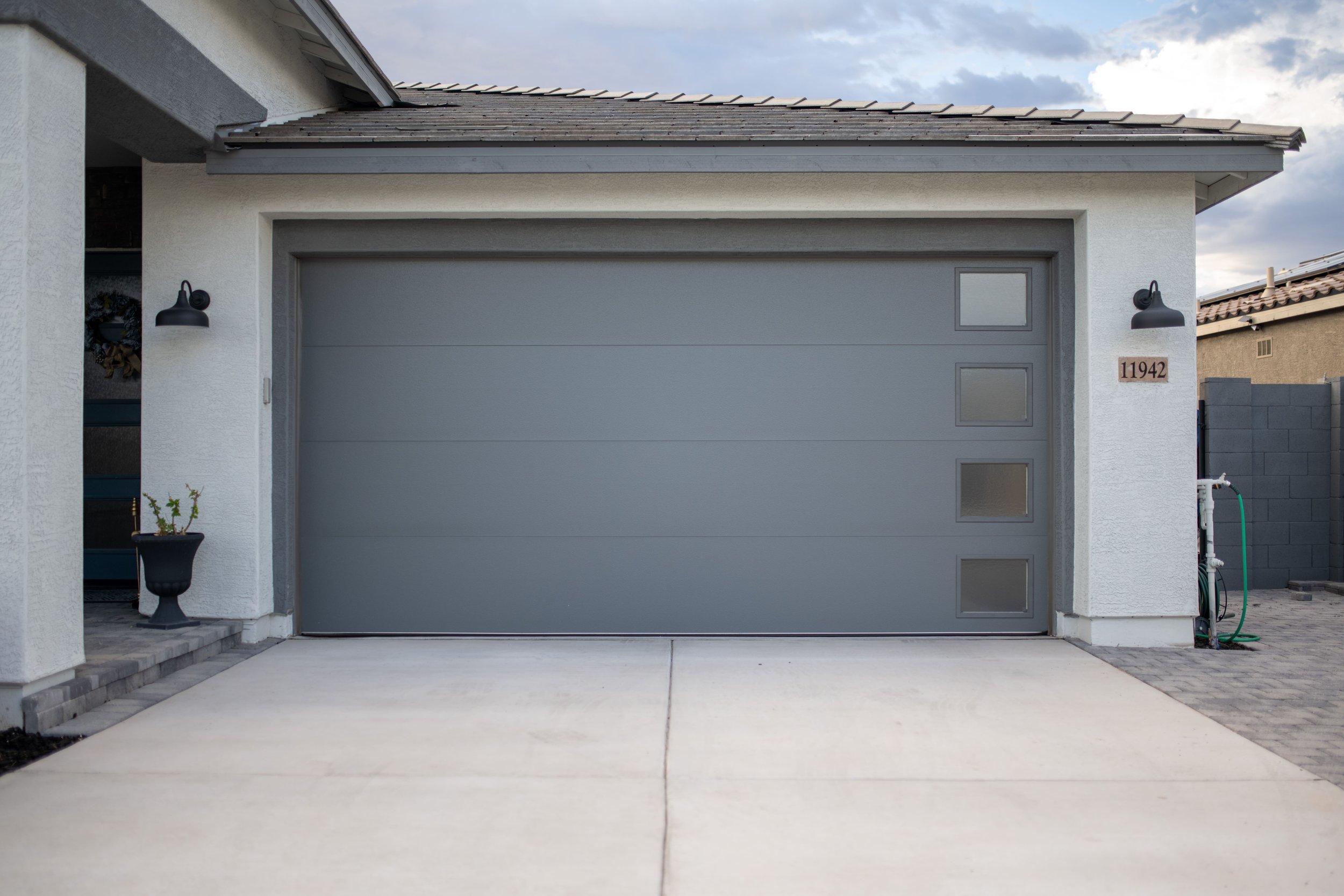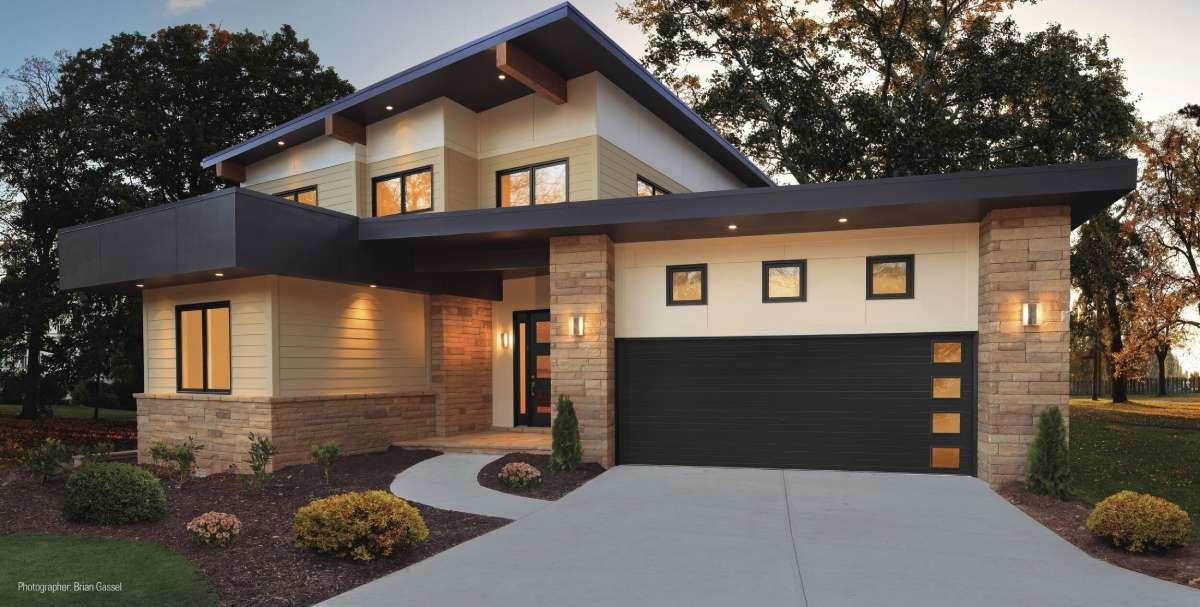
Garage Door Insulation in Mesa, AZ
Serving Phoenix, Mesa, Chandler, Glendale, Scottsdale, Gilbert, Tempe, Peoria, Surprise, Casa Grande, and Maricopa
Garage door insulation offers a practical solution for controlling heat and noise, especially in desert climates like Mesa. With summer temperatures soaring, an insulated garage door helps manage interior conditions more effectively. Garages connected to living areas or used for daily activities benefit greatly from this added layer of comfort. Insulation can also support quieter operation and a more durable door structure over time.
We’ve seen how improved insulation reduces thermal transfer, keeping indoor temperatures more stable and reducing energy strain. Materials like polyurethane or polystyrene are popular choices, each offering specific benefits depending on garage size, door style, and usage. Installation can often be completed without replacing the door itself, making it a simple upgrade that adds real value.
Our team works with property owners across Mesa who are looking for energy savings and reliable performance. A properly insulated door can help protect belongings, make workspaces more usable year-round, and reduce the intrusion of dust and outside debris. Garage doors are one of the largest moving parts on a property, and an upgrade like insulation adds a level of performance that matches modern energy goals. By addressing gaps, adding weather stripping, and applying insulation panels, a noticeable difference can be felt. Whether the space is used for parking, hobbies, or home storage, insulation supports better usability and longer-lasting performance. Working with professionals familiar with local conditions helps maximize the benefits and select materials that perform well in the Arizona heat.
Benefits of Garage Door Insulation
-
Properly insulated garage doors serve as an effective barrier against outdoor temperature extremes, preventing heat transfer between the garage and the outside environment. This thermal regulation significantly reduces the workload on heating and cooling systems, leading to noticeable reductions in monthly utility bills. During winter months, insulation retains warm air inside the garage, while in summer, it blocks heat from entering. Homes with attached garages particularly benefit as the temperature-controlled air from living spaces no longer escapes through an uninsulated garage door, creating a more consistent indoor climate throughout the property.
-
Insulated garage doors maintain more stable temperatures within the garage space regardless of outdoor weather conditions. This temperature consistency proves beneficial for storing temperature-sensitive items like paints, electronics, and certain tools that might deteriorate under extreme temperature fluctuations. The regulated environment also creates a more comfortable workspace for homeowners who utilize their garage for hobbies, projects, or as a home gym. Additionally, vehicles parked inside experience less temperature stress, potentially extending the lifespan of car batteries and other automotive components that react poorly to extreme cold or heat.
-
Insulation materials effectively absorb sound vibrations, creating a dual noise-reduction benefit. From outside, street noise, neighborhood activities, and harsh weather sounds become significantly dampened, contributing to a quieter home environment. From inside, the insulation reduces the operational noise of the garage door mechanism itself, eliminating the disruptive rumbling and rattling often associated with uninsulated doors. This acoustic barrier proves particularly valuable for homes with bedrooms adjacent to or above the garage, allowing for undisturbed sleep even when the door operates during early morning or late evening hours.
-
Insulated garage doors typically feature multi-layered construction with additional reinforcement, creating inherently stronger doors that resist dents, dings, and daily wear. The insulation core provides structural stability that prevents warping and bending over time. This enhanced durability translates directly into extended lifespan, with insulated doors often outlasting their uninsulated counterparts by many years. The reduced impact of temperature fluctuations also minimizes material stress on door components, decreasing the frequency of necessary repairs and maintenance while maintaining smooth, reliable operation throughout changing seasons.
Common Issues with Poor Garage Door Insulation
Our Reviews

Our Garage Door Insulation Process
-
Our process begins with a comprehensive evaluation of the current garage door setup. During this visit, our technicians carefully examine the door material, existing insulation (if any), measuring dimensions and identifying specific areas where heat transfer occurs. We assess the garage's location relative to living spaces, noting adjacent rooms that might be affected by temperature fluctuations. This detailed assessment allows us to identify structural challenges, potential moisture issues, and operational quirks unique to each door. We also discuss homeowner priorities – whether noise reduction, energy savings, or workspace comfort ranks highest – tailoring our recommendations accordingly. This thorough approach forms the foundation for developing a customized insulation plan.
-
Based on the initial assessment, we work with homeowners to select the optimal insulation material. Our recommendations consider factors such as local climate conditions, garage usage patterns, and budget parameters. For metal doors, reflective foil-faced batts often provide superior performance, while wood doors might benefit from rigid foam panels. We explain R-values in practical terms, demonstrating how different materials perform in various conditions. Rather than pushing one-size-fits-all solutions, we present options ranging from economical polystyrene to premium polyurethane, highlighting the long-term benefits of each. This collaborative decision-making process results in insulation choices perfectly matched to specific requirements.
-
Before installation begins, we conduct thorough cleaning of the garage door surfaces. Our technicians remove accumulated dirt, grease, and debris that could compromise adhesion or create uneven application. Special attention goes to panel grooves, weatherstripping edges, and hardware fixtures where contaminants typically collect. We carefully inspect for existing damage, addressing minor repairs that might affect insulation performance. The door's operational components receive lubrication to maintain smooth function throughout the process. This meticulous preparation stage, while sometimes overlooked, proves crucial for maximizing insulation effectiveness and establishing proper bonding between materials, laying the groundwork for a successful installation.
-
With preparation complete, our team precisely measures and cuts insulation materials to fit each garage door panel. We utilize specialized tools to achieve exact dimensions, accounting for hardware mounts and structural features. For sectional doors, we install each panel individually, working methodically from bottom to top to maintain proper alignment. Our technicians apply appropriate adhesives or mechanical fasteners according to manufacturer specifications, creating secure attachment without compromising door operation. We pay particular attention to maintaining clearances between moving parts, preventing binding or interference. Throughout installation, we monitor door balance and spring tension, making adjustments as necessary to accommodate the additional weight of new insulation materials.
-
After installing the primary insulation, our technicians focus on addressing potential air leakage points. We apply weatherstripping along the door perimeter, creating an effective barrier against drafts and moisture intrusion. Special attention goes to the bottom seal, which experiences the most direct contact with varying surfaces. We carefully fill small gaps around hardware and panel joints with appropriate sealants, maintaining flexibility to accommodate door movement. This comprehensive sealing process eliminates thermal bridges – areas where heat transfer occurs despite insulation. Our detail-oriented approach maximizes energy efficiency by creating a continuous thermal envelope around the entire garage door system.
-
Upon completion, our team conducts rigorous quality checks to verify proper installation and performance. We operate the door through multiple cycles, confirming smooth movement and appropriate balance with the added insulation weight. Using thermal imaging equipment, we identify any remaining areas of heat transfer that might require additional attention. We verify weatherstrip compression and seal integrity around the entire perimeter. Operational noise levels are measured before and after to demonstrate acoustic improvements. This careful examination validates that all installation objectives have been achieved. We conclude by providing homeowners with maintenance recommendations and care instructions to maintain optimal insulation performance throughout changing seasons.
When a garage door lacks proper insulation in Mesa, AZ, where temperatures can reach extreme levels, homeowners often experience increased energy bills and uncomfortable living conditions.
Quality Overhead Door offers professional garage door insulation services that effectively regulate temperature, reduce noise, and improve energy efficiency throughout the year. With experienced technicians and quality materials, this local company delivers reliable solutions customized to meet specific needs. Contacting Quality Overhead Door represents a smart choice for Mesa residents looking to enhance their home's comfort and efficiency with professional garage door insulation.
Frequently Asked Questions (FAQs)
-
We provide foam board, reflective, batt, and spray foam insulation options.
-
Prices vary depending on insulation type, door size, and labor. Contact us for a free quote.
-
Yes, insulation prevents heat transfer, keeping your garage and home more energy-efficient.
-
Absolutely! We can retrofit insulation onto most garage door types.
-
Typically, it takes 2-4 hours, depending on the door’s size and complexity.
-
Yes! Insulation helps regulate garage temperatures, preventing excessive heat buildup.
-
We use lightweight yet effective materials, ensuring smooth door operation.
-
Yes! Insulation helps dampen outside noise and reduces vibrations.
-
Yes, it seals gaps that insects and rodents might use to enter.
-
Not necessarily! We can add insulation to your existing door.
-
The R-value measures insulation effectiveness. Higher values mean better temperature control.
-
In some cases, adjustments may be needed to balance the added weight.
-
Yes, it keeps cold air out, reducing heat loss in the garage.
-
Most insulation lasts 10+ years with proper maintenance.
-
Call us or book online for a free consultation in the entire Phoenix area!

